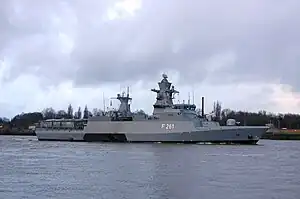.jpg.webp) Ludwigshafen am Rhein in 2016 | |
| Class overview | |
|---|---|
| Operators | |
| Preceded by | Gepard class |
| Subclasses | Sa'ar 6 class |
| Cost | |
| Built | 2004–present |
| In commission | 2008–present |
| Planned | 10 |
| Building | 4 |
| Completed | 6 |
| Active | 5 |
| General characteristics | |
| Type | Corvette |
| Displacement | 1,840 t (1,810 long tons) |
| Length | 89.12 m (292 ft 5 in) |
| Beam | 13.28 m (43 ft 7 in) |
| Draft | 3.4 m (11 ft 2 in) |
| Propulsion | 2 MTU 20V 1163 TB 93 diesel engines producing 14.8MW, driving two controllable-pitch propellers. |
| Speed | 26 knots (48 km/h; 30 mph) |
| Range | 4,000 nmi (7,400 km; 4,600 mi) at 15 kn (28 km/h; 17 mph)[1] |
| Endurance | 7 days; 21 days with tender[2] |
| Complement | 65 : 1 commander, 10 officers, 16 chief petty officers, 38 enlisted |
| Sensors and processing systems | |
| Electronic warfare & decoys |
|
| Armament |
|
| Aircraft carried | Helicopter pad and hangar for two Saab Skeldar |
The K130 Braunschweig class (sometimes Korvette 130) is Germany's newest class of ocean-going corvettes. Five ships have replaced the Gepard-class fast attack craft of the German Navy.
In October 2016 it was announced that a second batch of five more corvettes, originally to be procured from 2022–2025 but now reportedly delayed.[4][5] The decision was in response to NATO requirements expecting Germany to provide a total of four corvettes at the highest readiness level for littoral operations by 2018, and with only five corvettes just two can be provided.[6]
Technical details
They feature reduced radar and infrared signatures ("stealth" beyond the capabilities of those of the Sachsen-class frigates), and will be equipped with two helicopter UAVs for remote scouting. The German Navy ordered a first batch of two UMS Skeldar V-200 systems for the use on the Braunschweig-class corvettes.[7] The hangar is too small for standard helicopters, but the pad is large enough for Sea Kings, Lynx, or NH-90s, the helicopters of the German Navy.
Originally, the K130 class was supposed to be armed with the naval version of the Polyphem missile, an optical fiber-guided missile with a range of 60 km (37 mi), which at the time was under development. The Polyphem program was cancelled in 2003 and instead the designers chose to equip the class with the RBS-15. While the RBS-15 has a much greater range of 250 km (160 mi), the current version mounted on the ships, Mk3, lacks the ECM-resistant video feedback of the Polyphem. The German Navy had ordered the RBS-15 Mk4 in advance, which is a development of the Mk3 with increased range —400 km (250 mi)— and a dual seeker for increased resistance to electronic countermeasures.[8] The RBS-15 Mk3 has the capability to engage land targets.[9]
Difficulty of classification
Vessels of this class do not have an executive officer (German: Erster Offizier). Traditionally, in the German Navy, this was used as a rule to classify a vessel as a boat, not a ship. In a press release, the German Navy stated that these corvettes will be called ships nonetheless because of their size, armament, and endurance.[10] The commanding officer wields the same disciplinary power as a German Army company commander, not that of a battalion commander as is the case with the larger German warships such as frigates.[11] However, in size, armament, protection, and role, these corvettes resemble modern antisurface warfare light frigates, the main difference being the total absence of any antisubmarine warfare related sensors or weapons.
Contracting
The contract for first five ships was awarded in December 2001 Blohm+Voss, at that time owned by ThyssenKrupp Marine Systems, Nordseewerke, and Friedrich Lurssen Werft. The first ship, the Braunschweig, built at Blohm+Voss, was launched in April 2006 and was commissioned in April 2008. The second ship was commissioned in 2008.[12] The final three ships in Batch I were commissioned in 2013.[13] Severe problems with the gearing provided by MAAG GmbH of Winterthur, Switzerland, delayed the commissioning of the corvettes. Further issues occurred with the air-conditioning system and exposure to toxins from exhaust and missile systems.[14]
In May 2015, the Israeli government ordered four Sa'ar 6-class corvettes, whose design by ThyssenKrupp Marine Systems will be loosely based on that of the Braunschweig-class corvette,[15] but with engineering changes to render the baseline platform more militarily robust.[16]
In April 2017, the German government announced a contract for a further five ships to the same group as before, but the process under which it had been awarded was challenged at the German Federal Cartel Office by the German Naval Yards and the contract was voided in May.[17][18]
In September 2017, the German Navy commissioned the construction of five more corvettes in a consortium of North German shipyards. Lürssen will be the main contractor in the production of the vessels. The contract is worth around 2 billion euros.[18][19] In April 2018, the German government announced the specific arrangements under which the five new K130s would be built.[20][21]
Plans to build a third batch (i.e. ships 11–15) are under consideration, ships from the first batch (i.e. ships 1–5) would be decommissioned from 2025 and sold to a NATO ally in order to avoid modernization costs.[22]
In September 2022 it was reported that increasing difficulties in integrating the command and control systems for the Batch 2 ships had resulted in a cost growth of 401 million Euros and at least a two year delay for the completion of the lead Batch 2 vessel, and potentially cascading delays for the next two ships in the Batch 2 program as well.[4]
Ships in class
The ships were not built at a single shipyard; sections were constructed at different locations at the same time and later married together. The table lists the yard where the keel-laying ceremonies were held. Due to the decommissioning of the Gepard class, five additionally being constructed from 2019–2025.[23]
| Pennant number |
Name | Shipyard | Laid down | Launched | Commissioned | Status |
|---|---|---|---|---|---|---|
| Batch 1 | ||||||
| F260 | Braunschweig | Blohm+Voss | 3 December 2004 | 19 April 2006 | 16 April 2008 | In active service |
| F261 | Magdeburg | Lürssen-Werft | 19 May 2005 | 6 September 2006 | 22 September 2008 | In active service |
| F262 | Erfurt | Nordseewerke | 22 September 2005 | 29 March 2007 | 28 February 2013 | In active service |
| F263 | Oldenburg | Blohm + Voss | 19 January 2006 | 28 June 2007 | 21 January 2013 | In active service |
| F264 | Ludwigshafen am Rhein | Lürssen-Werft | 14 April 2006 | 26 September 2007 | 21 March 2013 | In active service |
| Batch 2 | ||||||
| F265 | Köln | Lürssen-Werft Blohm+Voss[24] | 25 April 2019 | 30 October 2020 | Projected 2025[4] | Sea trials[25][26] |
| F266 | Emden | 30 January 2020 | Under construction | |||
| F267 | Karlsruhe | German Naval Yards Kiel[24] | 6 October 2020[24] | Under construction | ||
| F268 | Augsburg | 13 July 2021[27] | Under construction | |||
| F269 | Lübeck | 15 March 2022 | 2025? (Planned) | Under construction | ||
Images
 Braunschweig
Braunschweig Magdeburg
Magdeburg Oldenburg
Oldenburg.jpg.webp) Ludwigshafen am Rhein
Ludwigshafen am Rhein
See also
References
- ↑ "Corvette Braunschweig Handed Over" (Press release). ThyssenKrupp AG. 30 January 2008. Archived from the original on 13 December 2019. Retrieved 14 May 2015.
- 1 2 "Korvette "Braunschweig"-Klasse (K 130)" (in German). German Navy. Retrieved 7 October 2015.
- ↑ "K130 Braunschweig Class Corvette - German Navy". Navyr ecognition. 13 August 2013. Retrieved 7 October 2015.
- ↑ "Fünf neue Korvetten für die Bundeswehr", Faz, 14 October 2016.
- ↑ "German Navy to Get Five More K130 Braunschweig-class Corvettes", Navy recognition, 14 November 2016.
- ↑ BAAINBw Procures New Helicopter Drones for the Navy, Baainbw, 27 September 2018, retrieved 2 March 2019.
- ↑ "de:Neue Aufgaben der Marine mit moderner Ausrüstung" (in German). German Navy. 17 May 2004. Retrieved 14 May 2015.
- ↑ German Navy K130 Corvettes Ready for Saab RBS-15 Mk3 Anti-Ship Missiles, Navy recognition, 8 June 2016.
- ↑ Struckhof, Detlef (22 January 2009). "Warum Korvetten Schiffe und keine Boote sind" [Why corvettes are ships and not boats] (in German). Presse- und Informationszentrum Marine. Retrieved 3 February 2010.
- ↑ "Wehrdisziplinarordnung (WDO)" (in German). German Federal Ministry of Justice and Consumer Protection. Retrieved 14 May 2015.
- ↑ "K130 Braunschweig Class Corvette". Naval Technology. Retrieved 30 April 2018.
- ↑ "K130 Braunschweig class". Navy Recognition. 13 August 2013. Retrieved 1 May 2018.
- ↑ "Milliardenprojekt Korvette 130: Pannenserie reißt nicht ab - Marineinspekteur fordert schärfere Kontrolle". Norddeutcher Rundfunk via PressPortal (in German). 20 June 2011. Retrieved 14 May 2015.
- ↑ Azulai, Yuval (11 May 2015). "Israel signs €430m deal for German patrol vessels". Globes. Archived from the original on 13 May 2015. Retrieved 14 May 2015.
- ↑ Israeli Navy Marks Milestones at German Shipyards, By: Barbara Opall-Rome, August 4, 2016
- ↑ "Germany's K130 corvette construction award violates public procurement law, says tribunal - Naval Technology". Naval Technology. 21 May 2017.
- 1 2 "Germany awards €2.4bln contract for five new K130 corvettes". Naval Today.
- ↑ Kopp, Martin (13 September 2017). "Riesenauftrag von Bundeswehr: Blohm+Voss auf Jahre gerettet" (in German). Hamburger Abendblatt.
- ↑ "Four Shipyards Agree to Build New German Corvettes". www.defense-aerospace.com. April 9, 2018.
- ↑ "Wie Blohm+Voss vom Bau neuer Korvetten profitiert". Hamburger Abendblatt (in German). 6 April 2018.
- ↑ Editorial, Defense Brief (2021-07-14). "Germany begins construction of fourth of five new K130 corvettes". Defense Brief. Retrieved 2022-01-06.
- ↑ "Bundeswehr soll neue Korvetten bekommen", N-TV (in German).
- 1 2 3 "Marineschiffbau: Letzte Korvette in Wolgast auf Kiel gelegt". ostsee-zeitung.de. 15 March 2022.
- ↑ Groizeleau, Vincent (12 July 2023). "La nouvelle corvette allemande à la mer". Mer et Marine.
- ↑ "Die Taufe der Korvette "Kiel" in Hamburg". April 21, 2022 – via www.ndr.de.
- ↑ "#Kiellegung der künftigen #Korvette AUGSBURG in #Wolgast. Danke an die Organisatoren aus #Werftindustrie - #ARGE #K130 und @BaainBw. Wichtiger Schritt für @deutschemarine und das #1Korvettengeschwader. Und danke für den guten Kontakt zur künftigen Patenstadt @stadtaugsburg". Twitter. Retrieved 2021-07-13.
Bibliography
External links
- Korvette Braunschweig-Klasse @ Marine (official homepage of the German Navy)
- Manufacturer's website